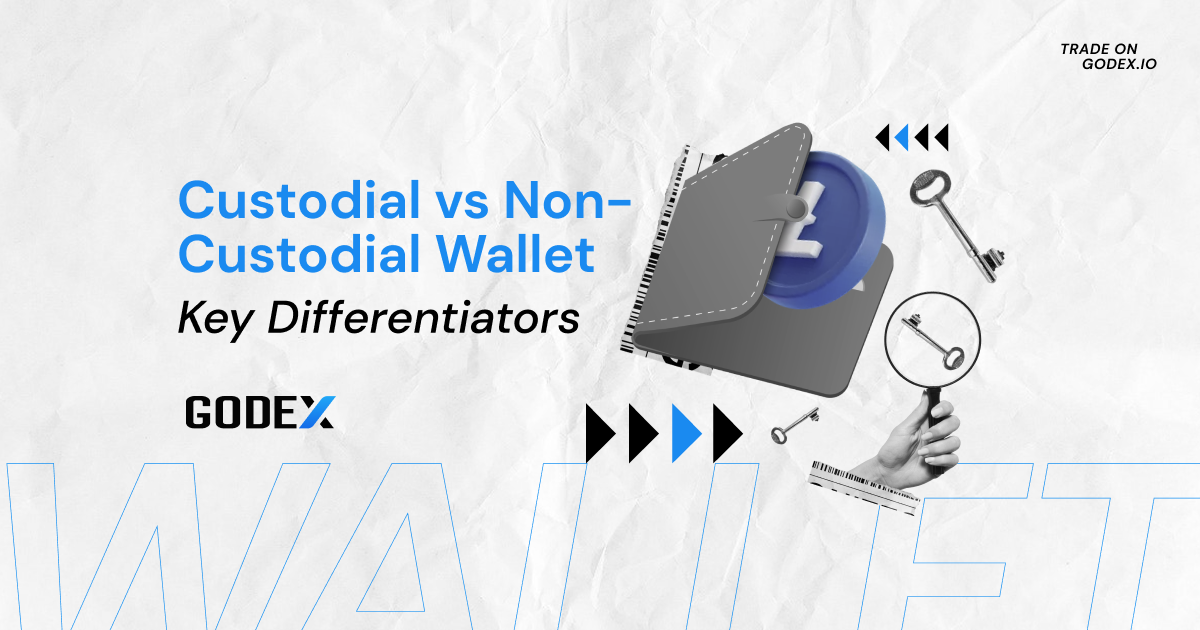Table of Contents
Decentralization, i.e. an idea standing behind cryptocurrencies gives each user overall autonomous control of his funds and private keys. Nevertheless, these days many services present custodian facilities and become engaged in storing users’ funds. In some situations, it is even convenient, but not for storing large amounts. All crypto storage types can be categorized into custodial VS non-custodial wallets. The following material focuses on their features and main distinctions to look for when choosing the wallet to suit your particular needs.
Defining Custodial and Non-Custodial Wallets
What is a custodial wallet? It stores the client’s private keys and bears liability for backing them up as well as safeguarding the user’s assets. Private API keys from such a wallet are available not only to the customer but also to the custodian. Many users agree to such conditions because wallets of this type are much easier to comprehend and can be accessed by login and password, at the touch of a button. However in this case the security suffers because the intermediary service may be hacked, or the custodian may decide to block your account for several reasons (including political ones).
What is a non-custodial wallet? This is a type of decentralized storage where the client possesses his private keys. It is an autonomous storage facility managed purely by its owner, as the assets are not transferred to an external party. The customer is provided with a file with private keys and a seed phrase that can be used to regain access to his funds. The self-custodial wallets are right for those willing to understand more about blockchain technology and immerse themselves in the investment process.
Сustodial wallet vs non-custodial wallet
Ownership and Control
Referring to a custodial wallet means that your private keys are stored by an external service liable for their crashworthiness and disbursement. With a self-custodial one, a holder fully accesses his proceeds and bears personal liability for their safety and security.
Security and Trust
Conventionally, custodial cryptocurrency wallets are considered less secure. The platforms store a huge amount of sensitive data and if someone manages to burst into the storage of such a company, your private and public keys can be stolen. Referring to a non-custodial wallet, the chances of breaking into private information are reduced to zero, as it is stashed exclusively on a user’s device.
Private Keys
As an owner of the custodial wallet, you can send and receive payments but you do not possess the keys. There is a huge plus in that because if you for example suffer from amnesia and forget or overslip your watchword it can be recovered quite easily by answering security check questions similar to those that are asked by any popular social network. In the case of a non-custodial wallet, you stash the public and private keys on your own, and by throwing them off you will face the unpleasant reality of losing access to your coin storage with everything in it. Since every non-custodial wallet automatically generates 12-24 random words to produce a secret reassembly phrase it is not that hopeless. But we don’t recommend testing the robustness of this theory.
Ease of Use
Custodial wallets are taken as more customer-oriented but not all of them by default. In contrast to just logging in and making a few mouse clicks, to connect a non-custodial wallet, you will have to enter a long chain of numbers and perform other actions based on the specifics of the wallet mark.
Transaction Speed and Costs
Approval of a transaction in a custodial crypto wallet is quite a complicated process with no user engagement as the platform refers to a centralized exchange to validate your operation and transfer the information to the blockchain. This may result in higher operational fees and slight speed reductions. Non-custodial wallets, on the other hand, use a direct method of conducting virtual agreements. They record changes to the blockchain in real-time mode and also do not engage any intermediaries, which helps to keep fees lower.
Recovery Options
You can effortlessly log into a hosting storage via various devices and recover access to your money by confronting the external service assistance desk. A non-custodial wallet in rarer cases also has a restoring option, but this process will be much more complicated. While some types of hardware wallets do not have access recovery procedures at all, most browser-based and mobile wallets provide users with a seed phrase, which shall be guarded like a pupil of an eye in order not to say goodbye to your proceeds for good. You should also beware of fraudulent sites that may provoke you to utilze the mnemonic phrase and in the result they will take possession of your funds.
Benefits and Disadvantages of Custodial Wallet
Accessibility is the topmost advantage inherent to custodial wallets. As soon as you simply enter your credentials to access your proceeds you can use them immediately. Since the services are provided by a centralized external party, transaction fees for using custodial wallets are vulgo lower. Also, when you trade on an exchange, you can always make a request to the technical support if something goes wrong. But most importantly, you will not lose your keys for good. By confirming your identity you will be able to log into your account again.
The disadvantages of this type of storage are also worth mentioning. Since you don’t control your private keys, you don’t technically own the coins in your wallet. The exchange owes you the money that is in your wallet, and in the meantime, it can use your funds for its purposes. You have to rely on the honesty of the platform developers. You also have no control over security, it depends on someone else’s actions, knowledge, and skills while always there is a danger of data leakage or hacker attacks targeting sensitive information. Finally, such wallets are dependent on the Internet. And what if the Internet doesn’t work? You know the answer.
Benefits and Disadvantages of Non-Custodial Wallet
A non-custodial vs custodial wallet looks very attractive because you are the one who solely has full control over your cryptocurrency and performs flexible management – for example, combining several different types of wallets for storage. You are the one who authorizes a transaction by application of private keys, which reduces the chances of data seepage. Complete confidentiality in transactions, no need to provide the intermediary with information about your payments will attract you even more. Some self-custodial wallets are not subject to an Internet connection, therefore your assets are accessible without time framing.
These wallets have a more sophisticated user interface. One typo can lead to a loss of monetary proceeds since you manage the funds on your own without an option to approach any customer support services. Therefore, if you mislay or damage the physical wallet in charge of your funds you will have to waive goodbye to your money. Of course, anyone can become a victim of a hacker attack, but since you do not preserve whopping amounts in your wallet compared to an exchange, hackers do not mark you with a top priority status.
Read also Defi Wallets – Best Wallets for Decentralized Finance
Choosing the Right Wallet for You: Factors to Consider
Considering custodial vs non-custodial wallets is a big-picture step you should take before starting crypto trading.
Cryptocurrency market trends show that non-custodial wallets will soon gain an advantage over custodial wallets. This is due to numerous cases of security breaches of centralized services. Users are becoming increasingly jealous about the safety of their funds and privacy. Non-custodial services offer great opportunities and have good prospects, so it is highly desirable to master working with them.
FAQ
What is the difference between a custodial and a non-custodial wallet?
Both options have pros and cons, but generally, any expert will confirm the rule “not your keys, not your money”. It is better to control your assets yourself than to give this right to a third party. Beginners often choose custodial services, as it is simpler and more convenient, easy to recover the passcode, etc. But it is inadmissible to store large sums in this way.
Are custodial wallets insured against losses or heist?
Frankly speaking, both variants have been vulnerable to hackers. While cryptocurrency exchanges are generally secure, there have been numerous violation attempts. Despite the occasional news of hacks of centralized cryptocurrency exchanges and custodial wallets, many traders and investors continue to hold significant sums on such platforms. Many experts note that non-custodial services are not as transparent and censorship-free as commonly thought, but it is still a cleaner and more community-minded option than hosting options.
Which wallet type is better for long-term cryptocurrency storage?
Self-custodial virtual purses entitle customers with super control of their keys and funds and remain popular for long-term investments because of better asset protection. In return, hosting wallets are the high case for speculative trading, as exchanges provide supplementary financial services.
Start a Cryptocurrency exchange
Try our crypto exchange platform
Disclaimer: Please keep in mind that the content of this article is not financial or investing advice. The information provided is the author’s opinion only and should not be considered as direct recommendations for trading or investment. Any article reader or website visitor should consider multiple viewpoints and become familiar with all local regulations before cryptocurrency investment. We do not make any warranties about reliability and accuracy of this information.
 Peter Moore
Peter Moore 
Read more
Ripple (XRP) price has been widely discussed by the cryptocurrency community since it has gained public interest in 2017, even though it was founded by Chris Larsen and Jed McCaleb years before. The platform offers innovative blockchain solutions for the banking sector and has the potential to disrupt the whole finance industry. In recent years, […]
In this article we will talk about Ripple (XRP) and its price prediction. What is Ripple (XRP) Ripple is a San Francisco-based startup that was launched in 2012 by Ripple Labs as a global network both for cross-currency and gross payments. Ripple history began in 2004 with the discussions around the digital coin in the […]
You may well think that an article dedicated to a Tether price prediction or the Tether price in general is a little bit strange — it is a stablecoin after all. However, the price of Tether does fluctuate significantly, although it is nowhere near as volatile as non-stablecoin cryptos. This means that staying up to […]
In the article we share our vision at Zcash cryptocurrency main features and add several price predictions. As cryptocurrencies gain global acceptance and decentralisation slowly enters our lives, privacy becomes the main concern when talking about blockchain adoption. It is no secret that distributed ledger is by far the most secure and transparent technology ever […]
Chiliz coin (CHZ) offers a compelling opportunity for traders interested in the intersection of blockchain technology and sports. By enabling fans to influence team decisions through the Socios app, Chiliz directly monetizes fan engagement and connects with major sports teams like Juventus and Paris Saint-Germain. These partnerships not only enhance the platform’s visibility but also […]
The exponential growth of Bitcoin Satoshi Vision (BSV) against the general bear trend on the cryptocurrency market in autumn 2019 has impressed the community. Due to the increasing market capitalization, the newly emerged altcoin was ranked 5th on CoinMarketCap and managed to maintain its high position at the beginning of 2020. In the article we […]